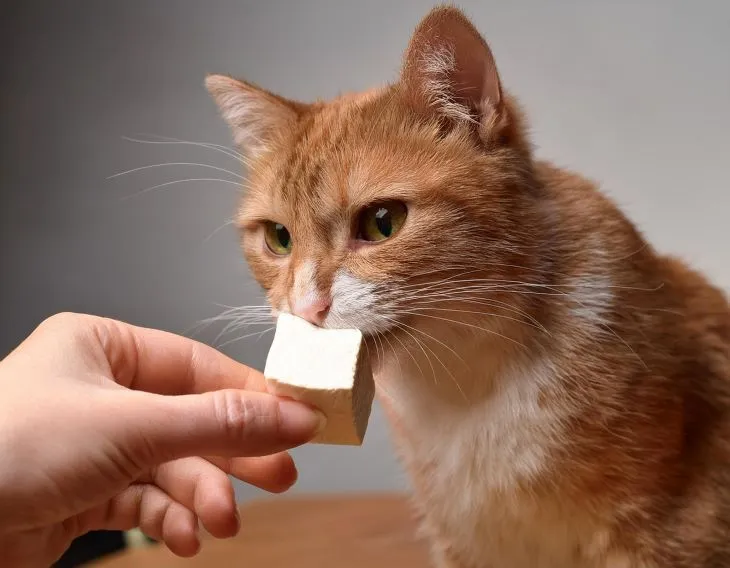Can Cats Eat Tofu? What Are The Benefits, Risks & Feeding Tips
By: Lana Koh

The information in this article is intended to educate cat parents and is not a substitute for veterinary guidance. In case of any concerns about your cat’s health, please talk with your veterinarian.
Tofu might seem like a harmless snack for humans, but should it be given to cats? Some foods like tofu are generally safe in moderation, but provide little or no nutritional benefit for cats. Feeding it in large amounts may upset your cat’s digestive system.
Let’s explore why tofu lacks essential nutrients for cats, understand the potential health risks, and learn how can cats eat tofu safely if you choose to offer it occasionally.
What Is Tofu? A Plant-Based Protein
To understand tofu’s role in a cat’s diet, let’s start with what it is. Tofu (also known as bean curd) is a plant-based protein made by pressing curdled soy milk into soft blocks and is widely used in human diets, especially among vegetarians. Nutritionally, tofu contains protein, iron, and calcium and is low in calories, but it lacks essential amino acids found in meat-based proteins. This limitation means that while tofu offers protein, it isn’t suitable as a primary protein source for obligate carnivores like cats.
Is Tofu Safe For Cats? Understanding The Basics
In small, infrequent portions, plain tofu is generally safe for cats and does not contain any toxic substances. However, tofu lacks taurine, an amino acid essential for a cat’s heart, vision, and immune health. Cats are obligate carnivores, meaning they depend on meat to fulfill their nutritional requirements. Plant proteins in tofu do not provide the balanced amino acids needed for their health, making it a poor nutritional substitute for high-quality animal proteins.
Potential Benefits Of Tofu For Cats
Although tofu is not recommended for regular consumption by cats, there are minor benefits to offering very small pieces occasionally:
- Low Calorie Content: Tofu’s low-calorie count can be useful if a cat is curious about new textures, as it won’t significantly impact their diet in minimal amounts.
- Moisture Content: Tofu has high water content, which could provide extra hydration for cats.
- Digestible Texture: Plain tofu, due to its soft consistency, may be easy for cats to chew if offered in tiny, bite-sized pieces.
Related Article: Can Cats Drink Milk?
Potential Risks And Downsides Of Feeding Tofu To Cats
Tofu can cause more harm than benefit if overfed. Here are the primary risks:
1. Digestive Issues
Cats’ digestive systems are not well-suited to process soy-based foods. Consuming tofu can lead to:
- Vomiting
- Lethargy
- Diarrhea or loose stools
2. Allergic Reactions
Some cats are sensitive to soy products, which could lead to itching, swelling, or even digestive disturbances.
3. Nutritional Inadequacy
Tofu lacks the animal-based proteins and amino acids, particularly taurine, essential for a cat’s health. Feeding tofu can lead to deficiencies if used as a replacement for animal protein.
4. Thyroid Issues
Some studies suggest that high soy intake could interfere with thyroid function in cats, leading to metabolic imbalances.
How To Serve Tofu To Cats Safely
If you choose to offer tofu to your cat, it’s important to do so in a controlled manner. Here are the guidelines:
- Start with a Tiny Amount: Offer a piece no larger than a small pea to see how your cat reacts.
- Monitor for Reactions: After feeding tofu, watch your cat closely for any adverse reactions such as vomiting or changes in behavior.
- Avoid Flavored or Processed Tofu: Stick to plain, unseasoned tofu, as additives like garlic or onions can be harmful to cats.
- Limit Frequency: Feed tofu very occasionally — ideally no more than once every two weeks.
- Serve Fresh: Make sure the tofu is fresh and hasn’t been sitting out, as spoiled tofu could cause additional stomach upset.
Types Of Tofu To Avoid Giving Cats
Not all tofu is safe for cats, and some types can pose greater risks to cats. Here’s what to avoid:
- Seasoned or Flavored Tofu: Often contains harmful spices like garlic or onions.
- Fried Tofu: High in oils and may include toxic ingredients.
- Marinated Tofu: Can contain unhealthy additives.
- Fermented Tofu: Too strong and could irritate a cat’s stomach.
Tofu As A Protein Source For Cats: Why It’s Not Enough
Unlike humans who can benefit from plant-based proteins, cats require meat to thrive. Tofu’s protein content does not have the amino acid profile that a cat’s body demands, particularly taurine. Regularly feeding tofu as a protein source could lead to malnutrition in cats over time. Always prioritize animal-based proteins for a complete and balanced feline diet.
Related Article: Can Cats Eat Tuna?
Frequently Asked Questions
Final Thoughts: Should You Give Tofu To Your Cat?
Tofu is safe in very small amounts, but it shouldn’t be a staple in your cat’s diet. It’s best to treat tofu as an occasional curiosity rather than a dietary supplement. As responsible pet owners, our priority should be to provide nutrient-rich, meat-based foods that cater to a cat’s specific dietary needs. Always consult a veterinarian before introducing any new food into your cat’s diet, particularly one with limited benefits like tofu.

About the Author
Lana Koh
Lana is a passionate cat lover with years of experience caring for her feline companions. As a dedicated volunteer at animal shelters, she’s gained valuable insights into the world of cats. Lana channels her love and knowledge into writing informative and engaging articles for fellow pet owners, covering topics like cat health, nutrition, grooming, behavior, and the special bond we share with our feline friends.
